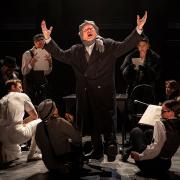At the outset of “The Gospel at Colonus,” Oedipus, blinded by his own hand, wanders the desert in exile. The once mighty Grecian king is now feeble, tortured by his past—the cursed prophecy fulfilled. His trek takes him to the village of Colonus where he seeks redemption, healing and a final resting place.
UChicago’s Court Theatre continues Oedipus’s journey, set to a soul-stirring gospel soundtrack, at the Getty Villa in Malibu, California.
Court has remounted its critically acclaimed reprisal of “Gospel” in September at the Getty Museum’s open-air venue modeled after ancient Greek and Roman theatres. Each fall, the Getty Villa’s Outdoor Theater series features a classical tragedy or comedy from respected theatres across the nation.
“It is an honor to bring ‘The Gospel at Colonus’ to the Getty Villa,” said co-director Mark J.P. Hood. “Charlie Newell and I have been developing this production for five years, and that time has been totally worth it. To finally be able to do this production in Chicago and have it be so well-received, and now, to be able to do it at the Getty? This is a God dream!”
“Gospel,” which ran this past summer as part of the Court’s regular 2022/23 season, recently received five of the theatre’s nine Jeff Award nominations.
The original production of “The Gospel at Colonus,” created by Lee Breuer and Bob Telson, was first staged at the Brooklyn Academy of Music in 1983. The musical adapts the original text of Sophocles’ “Oedipus at Colonus” and situates it in the Black Pentecostal tradition.
Court’s pared-down reprisal, with added inlays of Chicago’s own gospel history, marks the 40th anniversary of the groundbreaking and experimental play.
“I'm living my life’s dream in the journey of this production,” said Marilyn F. Vitale Artistic Director Charles Newell, “Gospel’s” co-director. “From having seen the original production in 1983 and now, 40 years later, here we are.”
Utterly life-changing
In 1983, Newell saw a play that changed his life. That night, at the Brooklyn Academy of Music, he wouldn’t have seen a single actor playing the role of Oedipus, but all five members of the gospel group The Blind Boys of Alabama. Morgan Freeman as The Messenger would have approached the pulpit dressed as a preacher—behind him, an entire gospel choir.
“I thought, ‘Oh my God, this is a classic Greek text told through the spirit of gospel Pentecostal spiritual experience,’” Newell said. “This is the kind of theater I want to commit my life to.”
The concept for “The Gospel at Colonus” solidified in Breuer’s mind when he came to see his collaborator, Telson, perform with The Blind Boys. Telson had been drawn to the pews of Black churches by the music and community he found there.
The two co-wrote a majority of the music in two short weeks, often lifting phrases directly from Robert Fitzgerald’s translation of Sophocles for the lyrics to create the feeling of a sermon.
“I read ‘Oedipus at Colonus’ when I was studying at Harvard, and was falling asleep turning the pages,” said Telson during an artist talk on Sept 10 at the Getty. “Lee found a way, by taking the book of Oedipus as the scripture reading of the day, to bring Greek tragedy to an accessible level.”
The events of “Gospel” follow “Oedipus Rex,” the first part of Sophocles’ trilogy. Written by the Greek playwright around the 5th century B.C.E, “Rex” tells the tragedy of Oedipus who unravels the mystery of his birth and the fulfillment of a horrifying prophecy to kill his father and marry his mother.
Court’s own version of the Oedipus trilogy will conclude this season with “Antigone,” which follows the story of Oedipus’s daughter/sister.
From Brooklyn to Chicago to California
Since its premiere in Brooklyn, “Gospel” has been performed in theaters across the nation, including a run on Broadway in 1988. For Newell, it was a lifelong dream to mount it at Court.
Newell partnered with singer and actor Mark J.P. Hood to direct Court’s production, which pared back the original cast to a more intimate size. Also among the changes to the original production was a Chicago spin to the music.
“Chicago is considered one of the birthplaces of gospel music,” said Hood during the artist talk. “I'm from Chicago, so I knew that we had to pay homage to the Chicago gospel sound.”
Like the original production, the experience of watching “Gospel” is uniquely immersive. As the preacher/narrator walks on stage, he immediately encourages the audience to speak, praise and respond.
“This isn't some sort of family drama on the stage where you are witness,” Telson said. “This is a situation where immediately you were invited to be part of the church experience.”
During the artist talk, Newell spoke about the potential challenges of bringing a production designed for a 250-seat theater to Getty’s larger, outdoor space—challenges overcome by the emotional power of the cast and band.
“Every night the production is getting stronger and more powerful,” Newell said. “Frankly, the whole production is getting more and more intimate and emotional because of what the artists are doing to expand and bring their full spiritual selves into each performance.”
Though the story is ultimately about the death of its main character, Newell wanted to think of the musical more as a tale of redemption and release for Oedipus—a feeling everyone could relate to.
“If we're going to do classic theater, we have to have a strong answer of why we are doing it now,” Newell said. “That was the comment that we heard most from audiences here in Chicago, which is, ‘Charlie, we needed this now.’”
“’The Gospel at Colonus’ has been utterly life-changing, ever since I first saw it at the Brooklyn Academy of Music in 1983,” said Newell, who recently announced he is stepping down as Court’s artistic director after 30 years. “The fact that I have been able to direct it, together with Mark J.P. Hood, has been such a gift; the fact that Court’s staging has touched so many, so deeply is a testament to the incredible cast, band, production team and creative team.”
—Tickets for Court Theatre’s 2023/24 season are available now.

